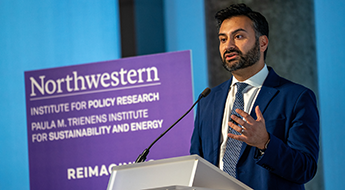New Community Policing Program Shows Some Positive Progress, But Requires More Work
Preliminary evaluation finds challenges arose due to the pandemic, aftermath of George Floyd, and others; offers recommendations for greater impact
Get all our news
Those are some of the biggest takeaways, just being involved in community policing on a different level, where you're actually helping the community and not harming, listening to individuals that said, ‘I was able to call my DCO and they helped me out with XYZ.’”
Community Resident

Chicago’s skyline, taken from the city’s East Village/Ukrainian Village neighborhood.
A two-year-old program in Chicago designed to change policing and ensure communities have a voice in how they are policed shows promise but has faced many challenges, including the COVID-19 pandemic, according to a new report from the Northwestern Neighborhood & Network Initiative (N3).
The Chicago Police Department (CPD), in collaboration with the Policing Project at New York University School of Law, launched the Chicago Neighborhood Policing Initiative (CNPI) in January 2019. N3, under the leadership of IPR sociologist Andrew Papachristos and executive director Soledad McGrath, is CNPI’s research and evaluation partner.
N3’s evaluation of the initiative found that the police and community participants show some positive changes, such as greater police visibility, more police attention to community concerns, and, most importantly, more meaningful interpersonal interactions between residents and police officers. However, several factors might have set back those interactions, like the pandemic, Chicago’s high rates of shootings and gun deaths, George Floyd’s murder and the subsequent protests, all of which strained police-community relations. Though researchers found no significant impact on crime or on residents’ trust in the police or their perceptions of safety, they note that in addition to the challenges already mentioned, the program had a small rollout.
As a community policing program, CNPI created new structures in two of the city’s police districts for both the police and the community. On the police side, the role of the District Coordination Officer was designed to foster closer relationships between officers and community residents. On the community side, Community Ambassadors are volunteer residents and leaders of local organizations, who partner with the police to bring about more trust and focus on policing issues important to the community.
CNPI was designed separately from the Chicago Alternative Policing Strategy (CAPS), which CPD launched in 1993. While both CAPS and CNPI include community engagement, CAPS officers are focused on districtwide community programming, while officers working in CNPI are focused on 1:1 relationships with community members.
N3 used a multimethod research design to learn if CNPI established the infrastructure and relationships needed to build trust and to partner with the pilot communities to create public safety together. The researchers conducted multiple in-depth interviews with police officers and community members across nearly 100 sessions. N3 tracked trends in perceptions of public safety and trust in the police before and after the program, comparing the findings with a statistically similar group of police areas.
Though the program does not seem to have increased overall levels of trust and safety due to the challenges of a year like no other, it has achieved some positive impacts. These mainly involve changes in the relationships between the police and the community, including increased police visibility and more meaningful interpersonal interactions.
One resident described how their DCOs went “above and beyond” to help a young resident they had arrested to get back on his feet by buying him shoes and finding him job. He noted, “Those are some of the biggest takeaways, just being involved in community policing on a different level, where you're actually helping the community and not harming, listening to individuals that said, ‘I was able to call my DCO and they helped me out with XYZ.’”
To sustain and expand the program and build on its positive aspects, the researchers offered several key recommendations.
On the policing side, they recommend:
- Shifting existing resources to increase staffing levels of officers in the program.
- Increasing consistency by keeping officers within in the program and not pulled out to answer other calls.
- Developing a consistent message with the police department and the community.
On the community side, they recommend:
- Increasing resources to train and compensate the Community Ambassadors.
- Better defining the Community Ambassadors’ roles.
- Developing a clearer plan for ongoing and future operations.
The researchers note that both residents and police want CNPI to not be just “another program,” but a new way of co-producing public safety.
Read the full N3 report.
Andrew Papachristos is professor of sociology, an IPR fellow, and faculty director of the Northwestern Neighborhood and Network Initiative (N3). Soledad McGrath is an IPR research professor and N3's executive director.
Photo credit: Stephen M. Scott.
Published: May 17, 2021.


